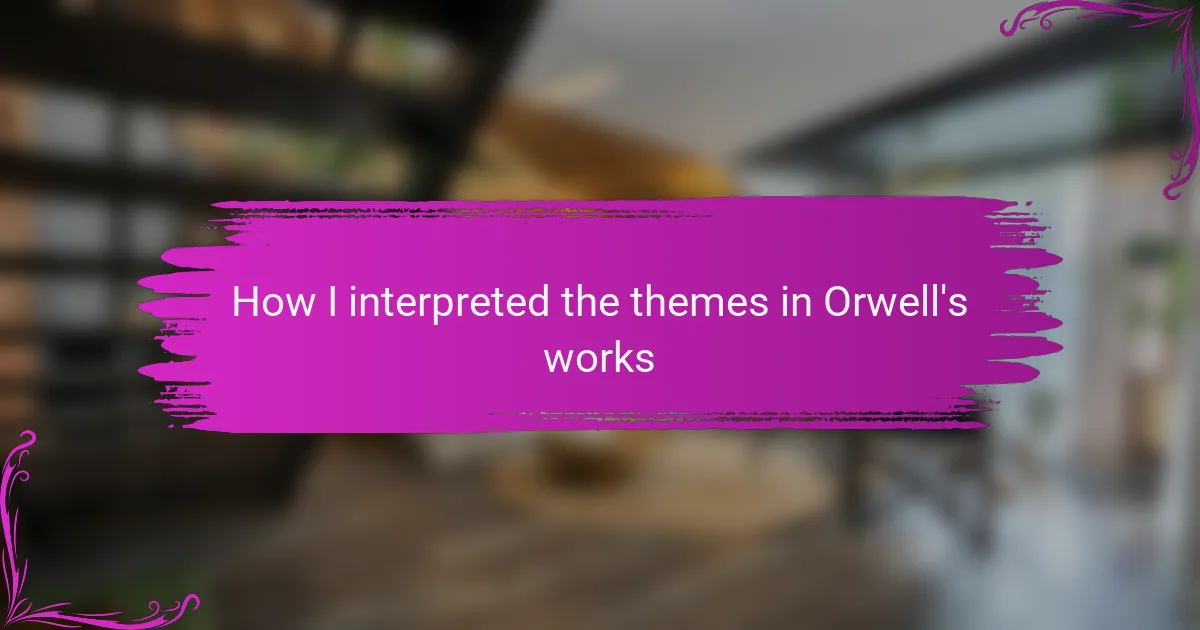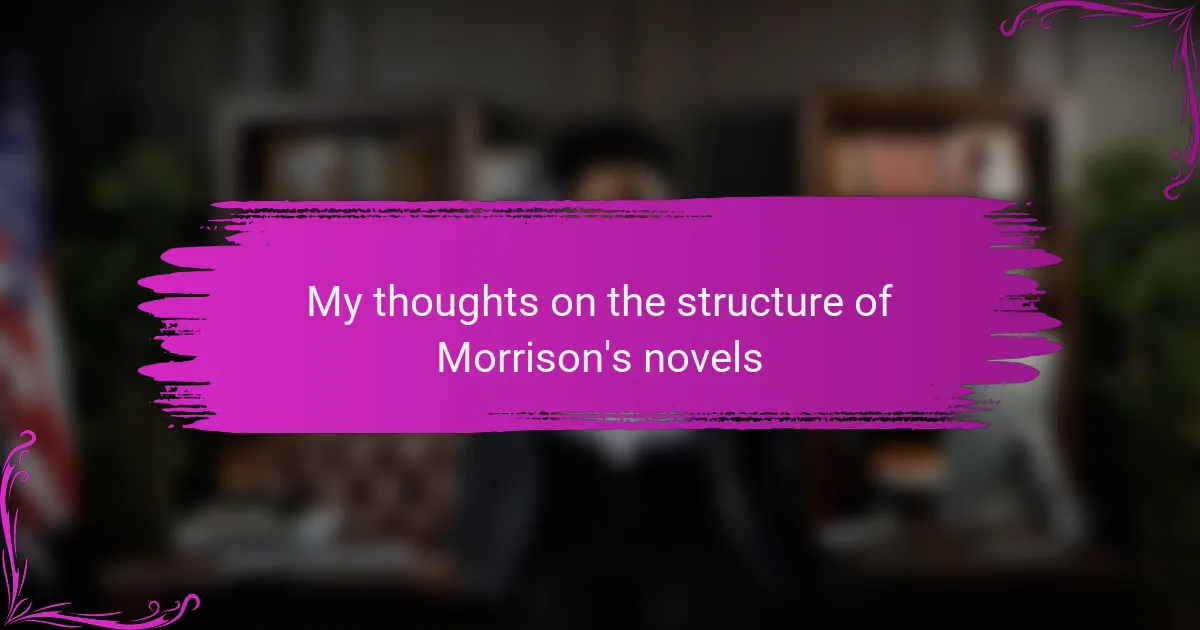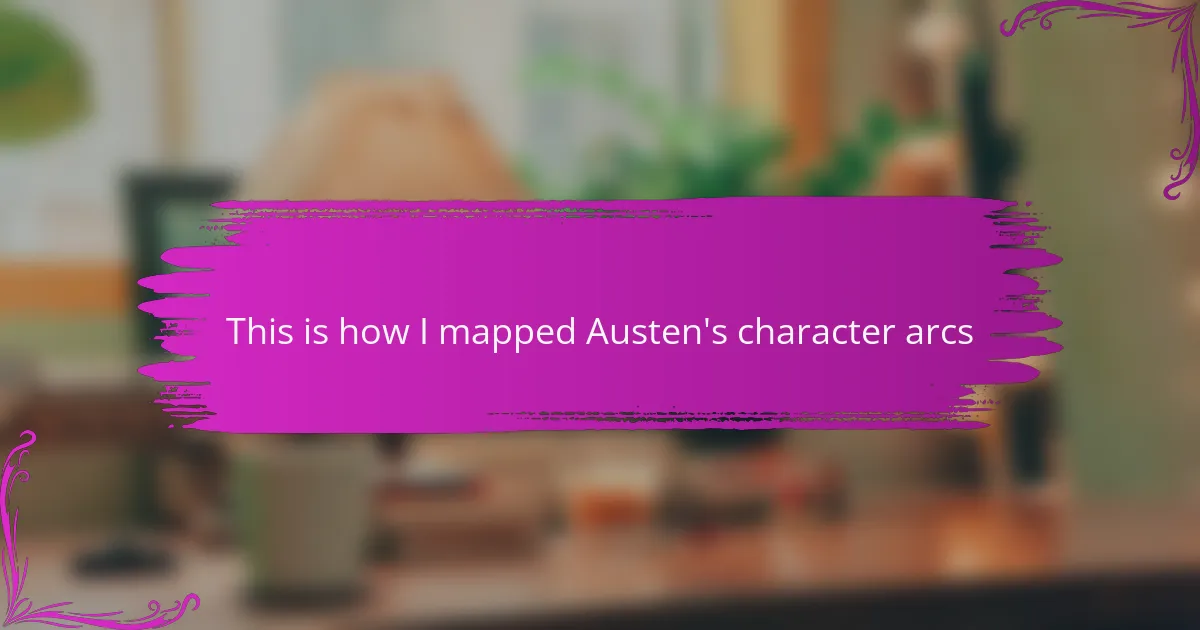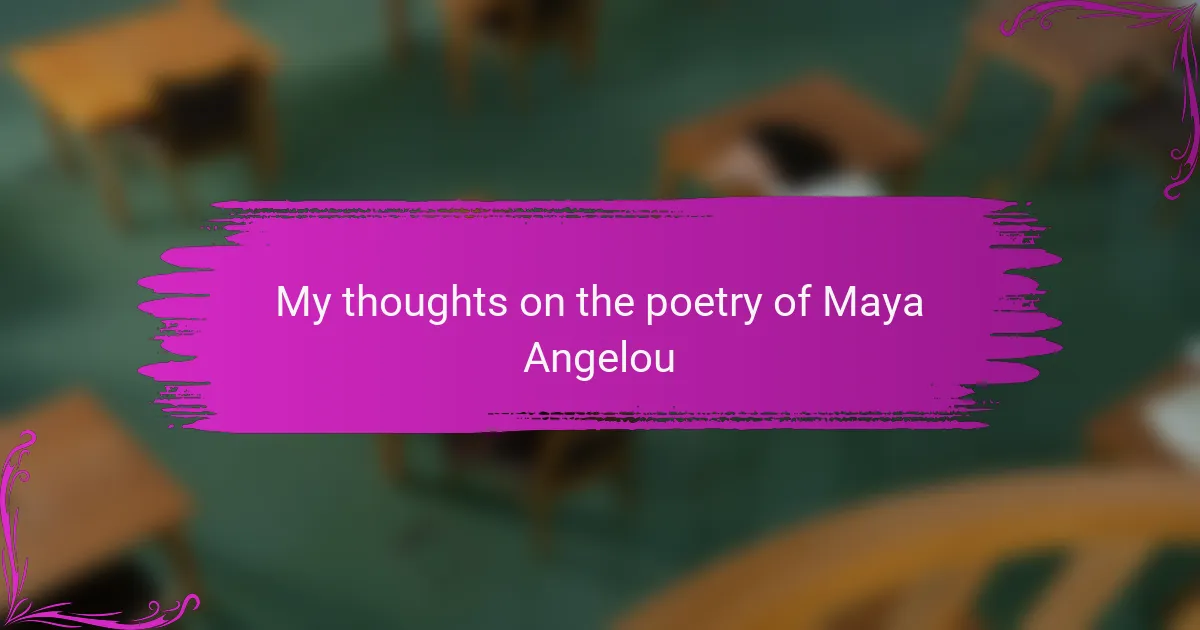Key takeaways
- Orwell’s literature critiques totalitarianism, societal control, and the importance of personal freedom, with a strong relevance to contemporary issues like surveillance and misinformation.
- His works, including “1984” and “Animal Farm,” highlight themes of power dynamics, corruption, and social inequality, prompting readers to reflect on modern political landscapes.
- Analyzing Orwell’s use of symbolism and historical context provides deeper insights into his messages about the human condition and societal structures.
- Further exploration through biographies, literary critiques, and online discussions can enrich understanding of Orwell’s themes and their lasting impact on society.
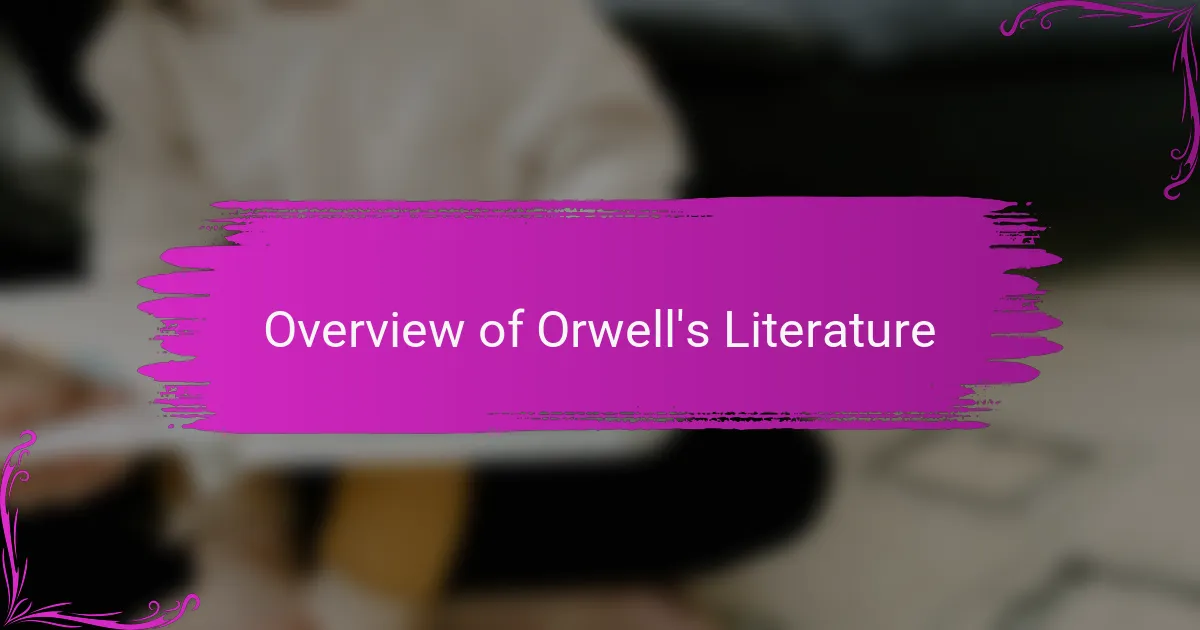
Overview of Orwell’s Literature
Orwell’s literature stands as a compelling exploration of the human condition under different political regimes. His works like “1984” and “Animal Farm” serve not just as narratives but as profound commentaries on totalitarianism and societal control. I’ve always felt a deep resonance with his themes, particularly the struggle for personal freedom amidst oppressive structures, which reflects my own views on the importance of individual rights.
In examining Orwell’s writing, I often find parallels between his fictional societies and our contemporary world. The manipulation of truth and language he critiques feels alarmingly relevant today. This emotional connection to his work inspires a deeper appreciation for the lessons buried within his compelling narratives.
| Work | Theme |
|---|---|
| 1984 | Totalitarianism and Surveillance |
| Animal Farm | Power and Corruption |
| Homage to Catalonia | War and Ideology |
| Down and Out in Paris and London | Social Inequality |

Key Themes in Orwell’s Works
Orwell’s exploration of totalitarianism in “1984” strikes me as a haunting reminder of how power can distort reality. The pervasive surveillance and manipulation of truth resonate with our modern concerns about privacy and information control. Have you ever found yourself questioning the information you consume? I know I have, and Orwell prompts that very reflection.
In “Animal Farm,” the theme of power and corruption glimmers with irony, showcasing how noble intentions can devolve into tyranny. I often think about how easily we can fall into the trap of blind allegiance, a notion that feels particularly relevant when I observe contemporary political landscapes. This theme challenges me to scrutinize leadership and remain vigilant against the seductive lure of power.
The vivid portrayal of social inequality in “Down and Out in Paris and London” strikes a chord with my own experiences. Having witnessed the stark realities faced by the marginalized, I connect deeply with Orwell’s insights into societal structures. It leaves me to ponder: how often do we overlook the struggles of others, and what can we do to bridge that gap?
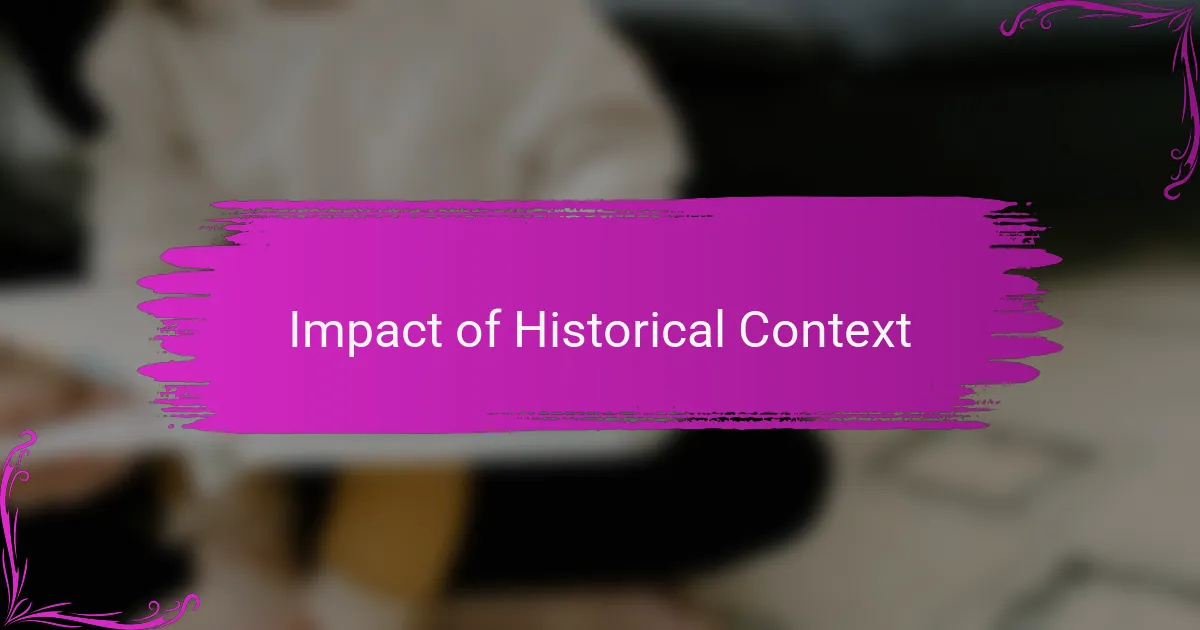
Impact of Historical Context
Orwell’s works, particularly “1984” and “Animal Farm,” are deeply influenced by the historical context of his time. Living through World War II and the rise of totalitarian regimes, Orwell presents a gripping portrayal of oppression and manipulation. For instance, I remember feeling a chill when I first read about the concept of “Newspeak” and how language can be twisted to suppress thought—it’s a reminder of how vital it is to protect freedom of expression in any society.
The atmosphere of fear and control prevalent during Orwell’s life is reflected not only in his novels but also in his essays and journalism. I often find myself connecting his observations to modern political climates, realizing that the themes of surveillance and authoritarianism resonate even today. After all, the struggle for truth and freedom of thought is timeless, and it’s fascinating to examine how personal experiences shaped Orwell’s interpretations of power and society.
| Historical Context | Impact on Themes |
|---|---|
| Rise of Totalitarianism | Explores oppression and government control |
| World War II | Highlights the consequences of propaganda and war |
| Post-War Environment | Reflects disillusionment with political systems |
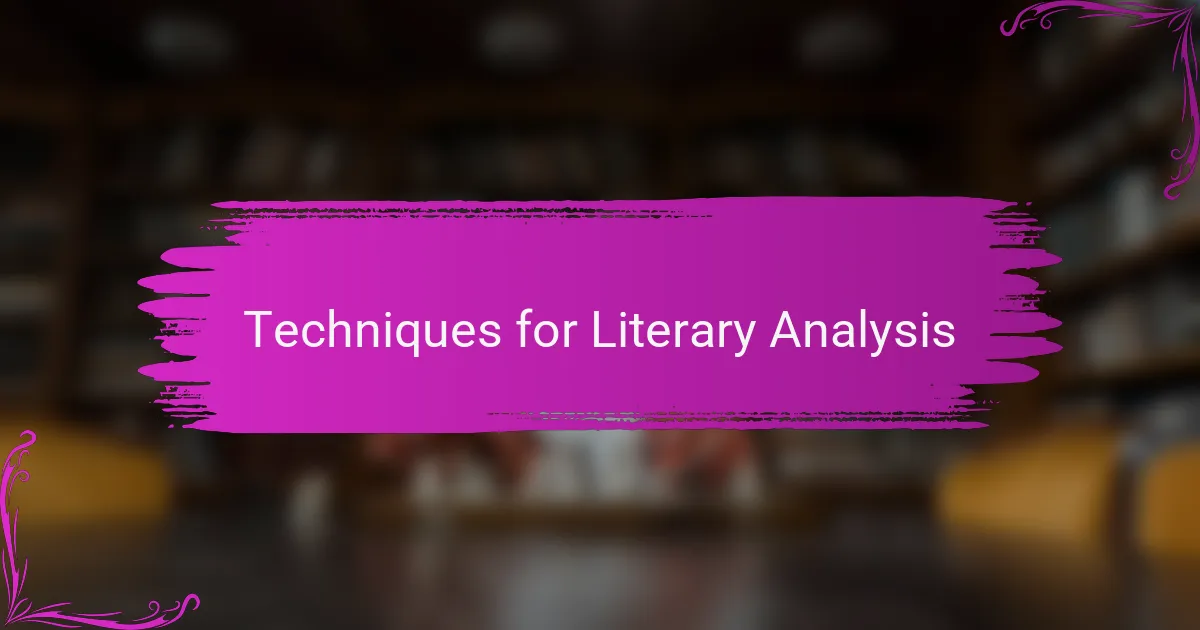
Techniques for Literary Analysis
When analyzing Orwell’s works, I often focus on his use of symbolism. For instance, in “Animal Farm,” the animals represent various real-world figures and ideologies, which allows readers to uncover deeper meanings about power dynamics and social structures. I remember the first time I grasped the layers of symbolism; it felt like discovering a hidden treasure in literature that truly reshaped my understanding.
Another technique I find invaluable is the examination of dystopian themes and their relevance to contemporary society. Orwell’s cautionary tales, such as in “1984,” resonate with me because they provoke critical thought about surveillance and individual freedoms. I often reflect on how his portrayal of a totalitarian regime echoes current events, which opens up discussions about our own world and challenges us to remain vigilant.
- Explore symbolism: Identify symbols used by Orwell and analyze their meanings.
- Examine themes: Focus on recurring themes like totalitarianism, freedom, and control.
- Consider context: Investigate the historical and social context of Orwell’s time.
- Analyze character development: Look at how characters embody or challenge these themes.
- Discuss narrative style: Consider how Orwell’s use of language and perspective affects reader interpretation.

Personal Reflections on Themes
When I first delved into Orwell’s works, I was struck by the chilling representation of totalitarianism, particularly in “1984.” It felt almost prescient, reflecting lingering fears about government control that resonate even today. I remember discussing this with friends over coffee, and we all collectively felt a sense of unease, realizing how relevant his themes still are in our modern society.
In “Animal Farm,” I found a powerful critique of power dynamics, where the struggle against oppression is portrayed so vividly through the allegory of the farm. It reminded me of my own experiences in group projects where, despite our intentions, it can be easy for individuals to seize control. This theme created an emotional connection for me as I reflected on leadership and the ethical responsibilities that accompany it.
- Totalitarianism and its manifestations in modern society
- The dangers of censorship and propaganda
- The consequences of unexamined authority
- The complexities of rebellion and betrayal
- The ethical dilemmas of leadership and power dynamics

Applying Themes to Today
Reflecting on Orwell’s work, I often find myself amazed at how relevant his themes remain today. For instance, the concept of surveillance in “1984” resonates with our current digital landscape, where privacy feels increasingly compromised. Just the other day, I caught myself thinking about how often I share personal information online—it’s almost eerie to consider how closely our lives are monitored, similar to Orwell’s dystopia.
Moreover, the theme of societal manipulation in “Animal Farm” feels especially pertinent. I’ve noticed how easily misinformation can spread, influencing public opinion and behavior. It reminds me of how important it is to critically evaluate the sources of our information, much like the animals’ gradual realization of their leaders’ deceit. These themes invite us to rethink our roles in society and challenge the narratives we encounter daily.
| Orwell’s Theme | Modern Relevance |
|---|---|
| Surveillance | Increasing digital surveillance and privacy concerns in society. |
| Societal Manipulation | The spread of misinformation and its impact on public opinion. |
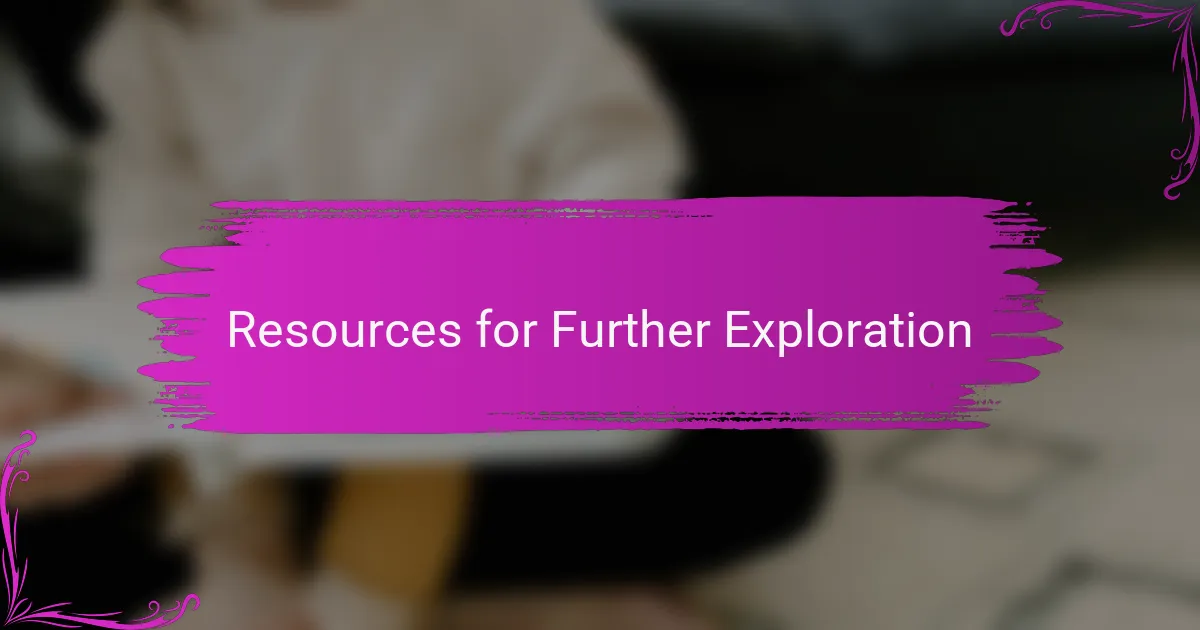
Resources for Further Exploration
When delving deeper into George Orwell’s works, I find that connecting with additional resources can significantly enhance one’s understanding of his themes. For instance, I often recommend exploring biographies about Orwell, which provide context about his life experiences that directly influenced his writing. This personal connection not only deepens appreciation for his literature but also allows us to see the world through his eyes.
Additionally, engaging with literary critiques and analysis can be really eye-opening. I’ve read several critical essays that opened my eyes to interpretations I hadn’t considered before, sparking new thoughts on freedom, oppression, and the manipulation of truth in Orwell’s narratives. It’s a reminder that literature often reflects our world, making such discussions vital for a comprehensive exploration of his works.
Resources for Further Exploration:
– “George Orwell: A Life” by Bernard Crick – A thorough biography that contextualizes his experiences.
– “The Anti-Social Media: Social Media as a Modern Orwellian Tool” – An insightful article discussing modern parallels to Orwell’s themes.
– “Orwell’s Politics: The Essays and Reviews” – A compilation of Orwell’s thoughts that offers a direct look at his philosophies.
– Online discussion forums like Goodreads and Reddit book clubs where readers share their interpretations and insights.
– Documentaries about Orwell’s life that provide visual context and narrative depth.
